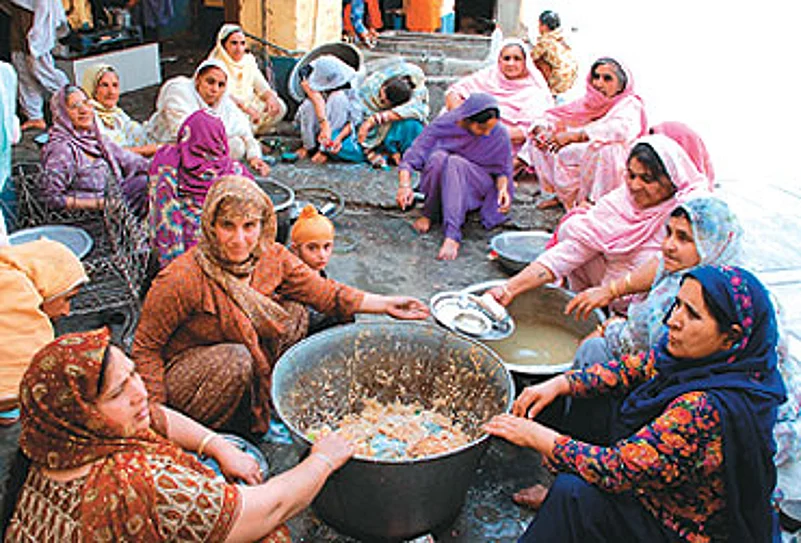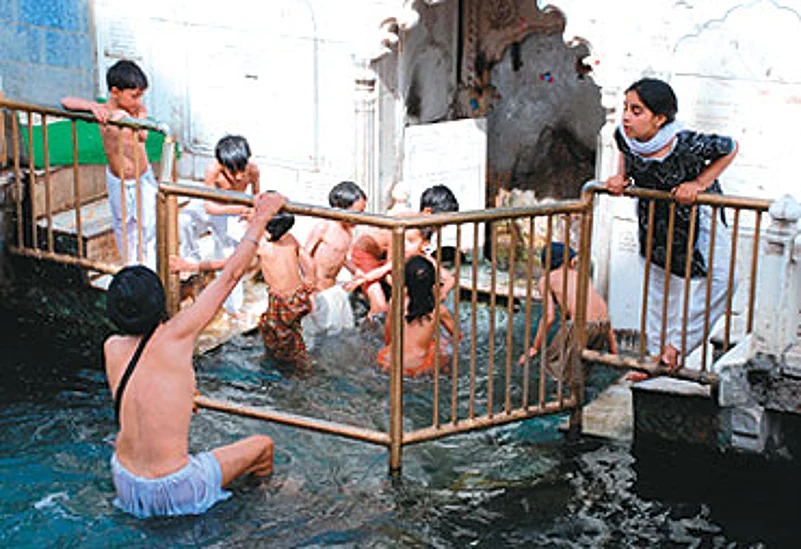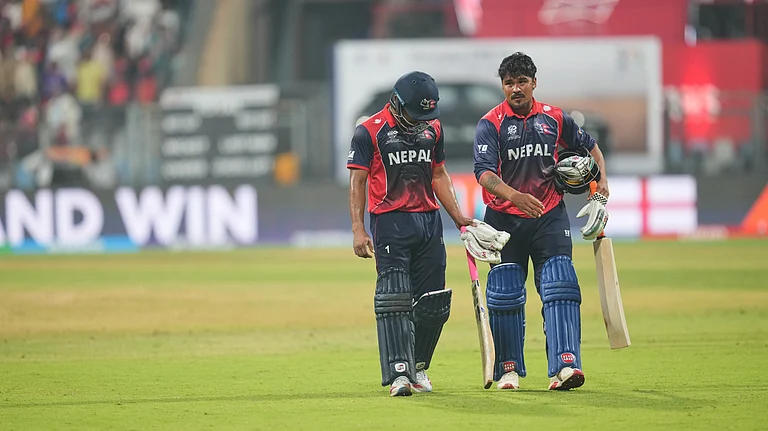These images surface as I stand, on a hot May day, before Gurudwara Sri Panja Sahib in Hasan Abdal, only an hour’s drive from Rawalpindi. I’m surprised to see such a large collection of Sikhs who, according to the Evacuee Property Trust Board, number just 35,000 countrywide. Revered for the impression of Guru Nanak’s palm on a sacred rock, Panja Sahib has now become the temporary abode of 400 Sikh refugees who have fled the fierce battle between the Pakistan army and Taliban in Buner and the Swat Valley. They weren’t expelled from their homes; their fate isn’t that of those from their community on whom jazia or religious tax was imposed in Orakzai Agency. They are frightened, distraught children of the insurgency, as much marked as their Muslim brethren among whom they lived only weeks ago.

Women performing kar seva
As I walk into the gurudwara, I see clean-shaven men, wearing shalwar-kameez, sitting on charpoys. They are conversing in perfect Pashto, an eloquent testimony to how deeply rooted they are in the NWFP (now named Pakhtoonkhawa), where 99 per cent of the Sikhs in Pakistan reside. Soon, Dr Suran Singh, who sports a flowing beard and a red turban, joins us and says, "What’s this propaganda that we have been forced to flee because of the Taliban’s oppression? Please, the media has to distinguish between what happened to the Sikhs in Orakzai and why we have come here." Even as we speak, groups of Sikhs continue to trickle in from Buner and Swat, the elders clutching small bundles, and children running to greet others of their age among the fresh batch of refugees.
As many voices rise to second him, I begin to get a sense of what happened to Pir Baba village. Apparently, the Taliban has been around in the area for nearly three years now, but refrained from establishing direct control or Islamising the people. Weeks ago, though, they swept into the village and stopped their vehicles in the bazaar. And though the district authorities had either fled or become ineffectual, the heavily armed Taliban didn’t diplay their firepower as is their wont. Says Suran, "Look, I’m sitting inside a gurudwara where I bow my head to the ground in prayers. Could I lie at such a holy site? We greeted the Taliban and offered them cold drinks. They said they would pay but we insisted they shouldn’t. They have been around for quite some time now, but left us alone. After all, we are not a threat to anyone."
Fear, however, began to seep into Pir Baba on April 28 when the Pakistan army initiated military operations, and the Taliban dug in their heels for a bloody battle. Pir Baba had become a veritable battle zone. Jaswant Kaur, a middle-aged mother of four, recalls the sudden decision to evacuate the area: "I was preparing breakfast and getting the children ready for school when a vehicle drove in. We were told to leave. No one cared to ask why. Not a woman or child has stayed back in Pir Baba." Some Sikh men, including Jaswant’s husband, did, hoping to protect and secure their property. As Suran says, "The fierce fighting would have blown us into smithreen. We are not armed. Our ancestors have lived in Buner for thousands of years and it was the fear of the ‘uncertainty’ that made us flee."

Devotees taking a holy dip
Uncertainty looms over these Sikh refugees—about those still in Pir Baba, about disrupted studies and dreams. Jaswant’s daughter, Roma, who speaks impeccable English, says pensively, "We can’t call our father because the communication system has been snapped. But, surprisingly, I got a call from my father early this morning. He’s alive." At the time of evacuation, Roma and other girls were taking school and college examinations. Amrika Kaur laments, "I was taking my second year exams. What will happen now? Please beg the government to allow us to take the Swat board exams wherever we are. Some were sitting for their improvement exams. This is their only chance to improve their grades. What will happen to them now?"
Impressed by their zeal, as also their smart dresses, I quiz these girls about the Taliban and their dress code, their opposition to education. Astonishment is palpable on their faces. They say the Taliban, in the three years of their presence in the area, never ordered them to stop studying; they only asked them to observe purdah. A girl cheekily says, "When we step out for school, we borrow the burqas from our neighbours." Adds Jaswant, "We are Pathans living in a village and purdah is our custom, our culture. So what, if the Taliban stressed more on covering up, we women really don’t mind."
Surely, they must feel apprehensive about the Taliban who have imposed jazia on the Sikhs of Orakzai Agency? Dr Suran, who has assumed the spokesperson’s role, says, "God only knows whether the ones in Orakzai, who are victimising the Sikhs, are Taliban or not. They could be someone else in the guise of the Taliban." It’s possible they fear retribution, consequently choosing not to get sucked into the volatile politics of the region. Suran is opposed to the Sikhs in India protesting against the imposition of jazia in Orakzai Agency. "They compromise our position as Pakistanis," he says. "Pakistan is Mecca for Sikhs because this is where Baba Guru Nanak was born. This soil is holy for us. In Pakistan, our religion alone is our protection."
Indeed, unlike the Sikhs, displaced Swatis have been living in miserable condition in Rawalpindi; Afghan refugees continue to languish; and when a batch of Bosnian refugees were brought here, many girls attempted suicide because they couldn’t fit in the alien culture. Wary of poor publicity, Islamabad has endeavoured to ameliorate the plight of the Sikhs. The gurudwara’s head granthi, Harindar Singh, says he has just received Rs 50,000 from Evacuee Trust Property Board, Lahore. "They told me over the phone that once this amount is exhausted, I only have to call them to receive fresh funds." Adds Dr Manoj Kumar, a Pir Baba resident who returned from the UK to serve his community, "The state of Pakistan treats us like a gul (flower). For example, many wanted to get a bridge built at Pir Baba but could not. Then I pursued the matter. I succeeded."
I say my farewell. They invite me to their village. A confident voice mutters, "Don’t worry, this too will pass." As I drive to Rawalpindi, I realise I have new memories to cling to and some old myths to re-examine.





















